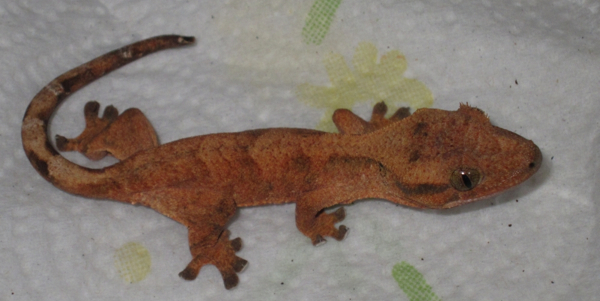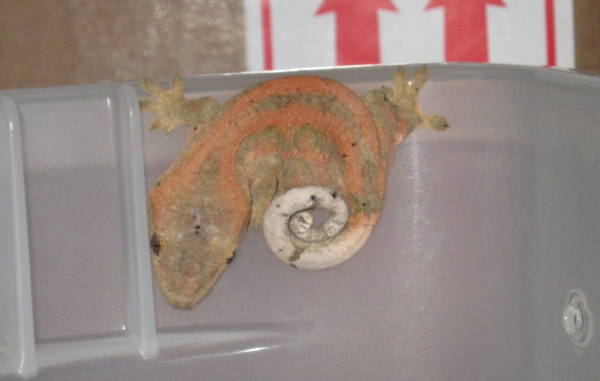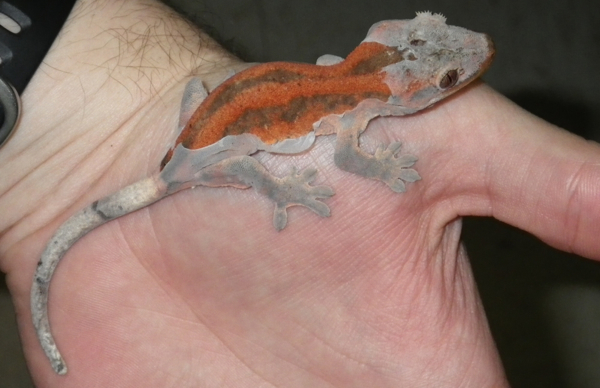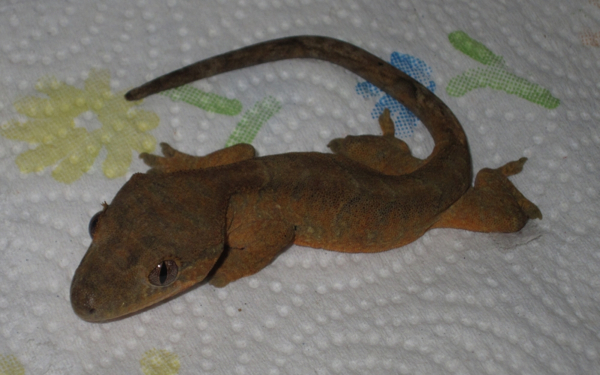I’ve been asked to write about a controversial topic in the reptile world-hybrids. I recently purchased a small group of third generation crested gecko x chahoua hybrids, which marks the beginning of my personal experience with gecko hybrids. I’ve kept reptiles for many years and have owned numerous hybrid snakes in that time. In the snake world, hybrid debates still swirl with some frequency but lizard hybrids aren’t as common at this point so while I’ve seen some discussion concerning them (mostly concerning crested x chahoua crosses, although crested x sarasinorum hybrids also occur in captivity) it seems that there are many misunderstandings, some of which I will hopefully help clear up with this article.
Hybrids and Fertility
First and foremost, reptile hybrids are not sterile…at least these aren’t. There are numerous intergeneric snake hybrids (crosses of snakes that are not only different species, but in different genera). Some of these are hybrids of shockingly different snakes-in some cases a terrestrial snake from one continent has been crossed with an arboreal snake from another continent. Most of these have already been proven fertile, and I’m personally not aware of any that are predominantly sterile. Crested x chahoua hybrids are fertile as evidenced by their ability to breed to a parent species. In the case of mine, hybrids were bred back to cresteds. Another rumor I’ve noticed spreading about these particular hybrids is that they are all males. While mine aren’t large enough to sex with certainty yet, I am aware of at least one breeder who has produced confirmed female crested x chahoua hybrids in the first generation, but I don’t know of any female hybrids that have reproduced yet.
Hybridization can also lead to asexual reproduction (parthenogenesis). In fact, most parthenogenic vertebrates owe their unusual form of reproduction to an ancestral hybridization event. I’d imagine many readers are beginning with a skeptical or even anti-hybrid stance concerning geckos. However, if you keep mourning geckos (Lepidodactylus lugubris), you’re already a hybrid keeper of sorts. This species is thought to have originated as a hybrid between L. moestus and an undescribed Lepidodactylus species. As some of you are no doubt aware, there are numerous distinct clone lineages. These contain both triploid and diploid lines, possibly originating from back crosses of diploid clones and males of a parent species (Radtkey et al., 1995).
I think it’s fair to say that hybridization occurs in nature far more often than the average person realizes. There is so much debate in the scientific community as to just what constitutes a species in the first place (there are numerous competing definitions and no universally agreed upon answer) that it’s really just a question of terminology in many cases. For example, if I bred black rat snakes from the eastern and western portions of my home state of West Virginia to one another several years ago, it was considered a normal breeding event. Now, due to reclassification of North American rat snakes, such a pairing would produce hybrid offspring by one definition since a species line has been drawn between these areas. What I’m trying to say here is that taxonomy is in a constant state of flux and the very determination of what is and is not a hybrid depends largely on the currently accepted boundary between any given species.
Hybrids and Ethics
Now, concerning the ethics of working with hybrids, it should come as no surprise that I have no qualms about keeping and breeding hybrid geckos if it is done responsibly. There are a number of people who believe that any hybrids kept in captivity will eventually cause some to be misrepresented as “pure” examples of one of the parent species and unknowingly allowed to contaminate the captive gene pool. I personally am not overly discouraged by this possibility for a few reasons. Firstly, the appeal of hybrids is their unusual appearance and the potential to produce color and pattern combinations that don’t exist in the parent species. So those interested in hybrids will look to produce more obvious hybrids rather than back-crossing until they can’t be easily distinguished from a parent species.
In the worst case scenario, let’s say a hybrid breeder irresponsibly breeds his hybrids back to cresteds until his offspring are very difficult to distinguish from un-hybridized crested geckos. If he dishonestly sells these as pure cresteds and the new owners are unaware that they are very diluted hybrids, they will just continue to breed them to their own crested geckos, further diminishing any remaining traces of the hybrid influence with each passing generation. So yes, in such a case, the buyer would be a victim of dishonesty, but I don’t see the potential for much actual harm in these circumstances due to the misrepresented geckos having a more diverse family tree than the buyer is led to believe. Furthermore, hybrids that most closely resemble cresteds are certainly not the most spectacular geckos with their very small crests and subdued coloration and patterns, making it highly unlikely that most breeders would be interested in them even if they were passed off as pure cresteds.
The possibility of misrepresentation or genetic contamination exists without hybrids anyway, and for better or worse, we all take a risk and trust the seller of a new gecko to be honest about its background. For example, someone may sell a female crested gecko as a proven breeder even if she has a history of calcium deficiency and is known to suffer from egg binding in order to make more money than offering her as a special needs pet. Others may offer geckos known to produce polydactyl offspring without disclosing such information to prospective buyers. Such unscrupulous people will always exist, but we shouldn’t stop working with the animals we enjoy just because some people have the potential to represent them as something they are not.
I’ve also heard the “hybrids are unnatural” argument quite a few times. As I stated earlier, this is not necessarily the case, although in the example of crested x chahoua hybrids, they probably don’t ever occur in nature. However, I’m not aware of any creamsicle or full pinstripe crested geckos occurring naturally either, but that doesn’t stop most of us from keeping them. I personally look for appearances that I like in the reptiles I keep, whether they are “natural” or not. While I still appreciate the wild type or natural colors and patterns of many species, there are plenty that have been selectively bred to look very different in captivity and that doesn’t bother me at all. If it’s healthy and makes an engaging pet, I don’t necessarily mind if no one would mistake it for a wild caught individual. Everyone has their own preferences and I don’t begrudge those who only like naturally occurring forms of reptiles and shun any morphs or “unnatural” variations-I simply have a different preference. I think there’s plenty of room for those of us with such different tastes to coexist in the hobby rather than trying to force our preferences on one another as sometimes happens.
My Hybrid Group
Now, I’ll try to lay out some of my observations about the hybrids I own concerning their morphology and how they differ from the parent species. The gentleman who produced them obtained a 2nd generation hybrid at a reptile show (produced by a 50/50 or first generation hybrid and a pure crested gecko). His male hybrid was kept with a female crested gecko which resulted in the third generation hybrid offspring I am now keeping. He told me that he had never bred any reptiles before this, which is a testament to the ease with which these can reproduce under proper conditions. Perhaps this is due to the greater crested gecko influence, since I have heard rumors that first generation hybrids are not as productive, although much of the discussion of these hybrids so far involves secondhand accounts and rumors, so I’d be interested to hear from those who have personal experience in this realm.
Of the four that I purchased, two look fairly similar to crested geckos as might be expected but two are obvious hybrids with vibrant coloration and in the case of one, a fairly unusual pattern reminiscent of some chahouas. I have noticed that the two obvious hybrids also have a wrinkle or “sleeve” around the base of the tail like a chahoua. Of the two that look similar to cresteds, one has wavy bars of what appears to be dark green on the dorsum and I’m interested to see how its coloration progresses with growth. This one is also showing pores already, so I have at least one male in the group. The other individual that resembles a crested is very plain at this time, but may change in appearance as it matures since it is showing a suffusion of red coloration lately. Two of them seem to have noticeably longer tails than a crested gecko, but this is a subjective observation that I haven’t attempted to quantify.
My favorite individual has a white tail, which contrasts nicely with its colorful red/orange body coloration. Of my group, it is the one that most resembles a chahoua in pattern, but it is also the most skittish (unlike every chahoua I have ever encountered) and I have observed it jumping to the ground and curling into a ball with its tail wrapped around its head when frightened. It is also the only one I’ve observed curling its tail in a spiral in the typical chahoua manner so far. They all have small eyelash scales and very small crests.
Breeding Plans
Due to the already heavy crested gecko influence, I do not intend to breed any of them back to crested geckos when they mature. Depending on how closely two of them resemble cresteds as they grow, I may opt not to breed those individuals at all though. All of mine are young enough that the potential for drastic changes in appearance still exists as they mature. So my plans for them are still uncertain and any future breeding will hinge upon appearance and sex ratio.
Of course any offspring produced will be labeled as hybrids regardless of appearance and I intend to provide detailed written documentation in the form of a certificate of some sort to try and ensure that they are correctly labeled in the event that one goes through several owners. I see a lot of potential for some very stunning geckos that are every bit as rewarding to keep as cresteds or chahouas by working with these. I hope this article helps to clear up some of the confusion surrounding these hybrids and that those who choose not to work with them can remain respectful of those who do, and vice versa.
As a final word of caution, I would like to impress upon anyone else who works with these the need to keep accurate records in order to prevent them from being misrepresented in the future as well as planning pairings carefully in order to produce offspring that can be readily identified as hybrids. Although I work with these hybrids, I still enjoy “pure” crested geckos or chahouas just as much as other keepers, and therefore don’t want irresponsible breeders allowing the two to mingle without proper documentation for future owners. I would also like to hear from others who have experience with these hybrids since firsthand observations are few and far between at this time.
References:
When Species Collide: The Origin and Spread of an Asexual Species of Gecko R. R. Radtkey, S. C. Donnellan, R. N. Fisher, C. Moritz, K. A. Hanley, T. J. Case Proceedings: Biological Sciences, Vol. 259, No. 1355, 145-152






First of all… great article! And thank you for helping publicize this!
Hey kevin,
First off great article, well written and very descriptive. I have an off topic question for you. I see you have a Masters in biology specializing in herpetology. I received my degree in accounting 4 years ago, ever since i have regretted not staying with my true passion since i was a kid and pursuing herpatology/zoology. Now 4 years out i have pondered the option of going back to school and completing my degree in biology or zoology and specializing in herpetology. Only problem is i dont know much about the potential jobs with the degree and im a little nervous about giving up a good paying job to go back to school and accrue debt. My question to you is how did you go about getting your degree, how has it been finding work, and do you have any tips for me on possibly going back to school? From what i researched so far it is basically impossible to get a biology degree online due to lab work that is necessary, any insight on that as well.
Thanks for your time,
Ryan Z
Ryan, I transitioned straight to grad school after I got my B.S. in environmental science because there aren’t many academic programs focused on herpetological natural history these days and I was fortunate to have access to one before my advisor retired. I currently have a state government job in the environmental field that doesn’t relate much to my background in zoology (more focused on water quality, chemistry, microbiology, etc in my particular case).
There are opportunities for positions more in line with my interests, but they would involve relocation and I’m happy in the area where I grew up and not interested in moving to take a new job. I do occasionally run across opportunities to work in the private sector for consulting firms as well, which would involve electrofishing, habitat assessments, and similar field work, but I haven’t yet made any jumps to that line of employment (got a taste of it one summer while I was an undergrad though).
As you said, it’s not a degree that is offered online and I had to conduct thesis research (studying cave-associated salamander populations in my case), write up my results, and defend my thesis in front of a committee of professors in addition to the required course work to obtain my degree. It was some of the most physically and mentally taxing work I’ve ever done, but I absolutely loved it and would do it again in a heartbeat even though I’m not really taking advantage of my graduate degree in my current position. It was great fun and I do have the option of doing more with my advanced degree, as some of my peers did, if my priorities should ever shift that way. I hope that helps-feel free to throw any additional questions my way if I can be of service.
Talk about a bummer-I just put them under the scope and I’ve confirmed pores on 3 out of the 4…it’s not looking good for breeding now.
Ryan,
I also have a degree in biology with a specialization in population genetics, neuroendocrinology, and amphibian ecology. But I, similarly to Kevin, currently work for a state government public health position that does not utilize much of that experience. My current position also leans towards a more molecular/microbiology setting. I have found it quite hard to find a job that is geared towards herpetology or basic research apart from research fellowships and the rare wetlands scientist career from the Dept. of Fish and Game. Most of the available jobs nowadays are in the applied sciences such as biotech, environmental consulting, etc…Generally, I think the best way to go is to utilize your career as a means in order to support your passion as a herpetologist/naturalist.
Regard,
Matt
Thank you for your great article on gecko hybridization. Much appreciated..
Thanks for the info. You sound like you know what your saying. Your geckos have some really nice colors to them, where did you get them? I just got mine from pet co, he is a cute little guy but not as color full as some of the geckos that you have. how many geckos do you have?
Hello Kevin,
I’d be very curious to see if the hybrids retain their tails. I’ve never kept Cresteds because I’m not a fan of ‘frog butts’.
I do keep a large group of Tokay, and tail dropping is still an issue with these guys but in most cases they grow back.
I do like the white curly tail. Very nice.
All the best,
Michael
I just don’t get the point of doing it. Chewies are still $500+ animals why would you want to breed that to a crested? I personally just don’t see the practicality.
Hey great article. Quick question. do you know which was which gender when breeding. as in was the female a crested gecko? or was the female a Chahoua?
Thank you very much for an incredibly intelligent and informative writing on the subject of hybrids.